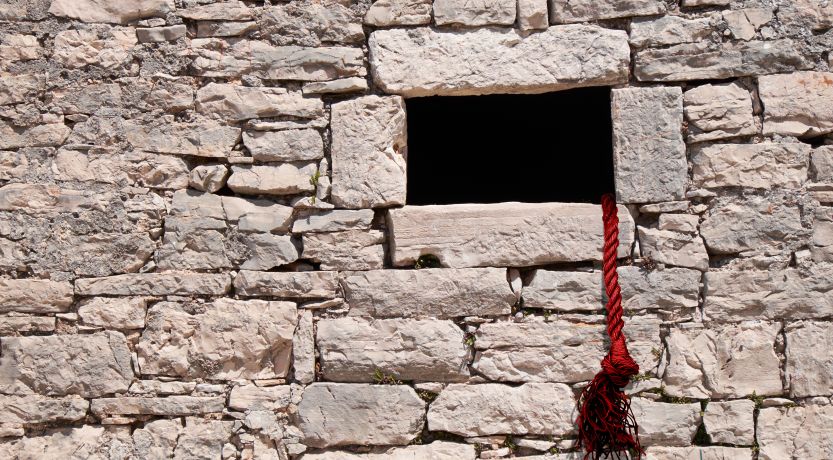Lessons From Rahab in the Bible
Rahab the harlot is one of the heroes of faith in Hebrews 11. Why is she considered a person of faith? What lessons can we learn from Rahab in the Bible?

Where is the story of Rahab in the Bible?
The story of how Rahab hid the Israelite spies and was therefore spared from Jericho’s destruction is recorded in Joshua chapters 2 and 6.
But there’s another name in the list that might not seem as obvious.
In verse 31, it lists Rahab the harlot as a hero of faith.
Who was Rahab in the Bible?
Rahab was the prostitute from Jericho who saved the Israelite spies from being caught by the authorities of Jericho. She savvily sent the spies’ pursuers on a wild goose chase. Her actions allowed the spies to safely escape the city and return to their people with information on Jericho.
Have you ever aspired to be like Rahab the harlot? Why is a prostitute mentioned among giants of faith like Noah, Abraham and Moses?
God inspired her to be included for a reason. What does He want us to learn from Rahab’s life and example?
Lesson from Rahab: The importance of faith and works
The two spies sneaked into Jericho and lodged in Rahab’s house. Harlotry was not considered shameful or immoral in Canaanite culture. It was even practiced in their religious worship.
Her house doubled as an inn and was visited often by travelers, so the two spies’ lodging there wouldn’t have aroused much suspicion ordinarily. However, the spies were spied upon.
This is a great lesson we can learn: like Rahab, we must act on our faith.
After the king of Jericho found out they were in the city, Rahab hid them on her roof (Joshua 2:2-6). Consider how brave it was for her to do this. Had she been caught, she probably would have been executed along with the spies.
Rahab risked all and put her trust in the God of Israel.
She showed her faith in Israel’s God through her actions and let the spies down the outer wall of the city by a rope through the window (Joshua 2:15-18). The book of James uses this as an example of how one is justified by one’s actions (James 2:25).
Rahab had faith and acted on it.
This is a great lesson we can learn: like Rahab, we must act on our faith. It’s not enough to just have faith and believe in God—we have to act on it through obedience. As James also wrote, “Faith without works is dead” (verse 26).
Lesson from Rahab: Faith by hearing, not from sight
Rahab’s journey of faith began by hearing of the miracles performed by the God of Israel. She had heard of the Red Sea miracle that God had performed 40 years earlier (Joshua 2:10). She believed because of what she heard. This illustrates a point about faith that Paul wrote: “Faith comes by hearing, and hearing by the word of God” (Romans 10:17).
The Israelites saw the Red Sea split, but they didn’t have enduring faith, as they continued rebelling against Him afterward. Rahab didn’t see the miracle, but believed by hearing of God and His power to part the sea.
Rahab showed belief and loyalty to God that was often lacking among the Israelites themselves.
As Christians today, we also must base our faith on hearing and reading. None of us have seen the mighty deeds performed by God in Bible times. But we read and hear about them—and believe. Jesus pronounced a special blessing on people who do this: “Blessed are those who have not seen and yet have believed” (John 20:29).
To believe what we have heard about but haven’t seen, we must have faith.
Not only did Rahab believe God, she confessed that “He is God in heaven above and on earth beneath” (Joshua 2:11). This is an amazing statement considering that she had spent her entire life in a pagan polytheistic culture. In this statement, she was forsaking her own gods as worthless.
Rahab showed belief and loyalty to God that was often lacking among the Israelites themselves. No, she didn’t fully understand God’s law and standards yet, as evidenced by her willingness to lie to save the spies, but her brave actions were due to her extraordinary faith.
Like Rahab, we can exercise faith and loyalty to the true God through hearing and reading about Him.
Lesson from Rahab: Wisdom is justified by her children
After the book of Joshua, Rahab isn’t mentioned in the Bible again until the opening chapter of the book of Matthew, where we find her in the genealogy of Jesus Christ.
Matthew 1:5 mentions her by name: “Salmon begot Boaz by Rahab.”
Rahab's example should stand out to us today that we, too, can have faith and act on it—no matter who we are or where we come from.
We don’t know much about Salmon, except he probably swam against the current, pardon the pun, by marrying Rahab the harlot. It was probably general known that she came out of prostitution, yet Salmon married her anyway.
Jesus said, “Wisdom is justified by her children” (Matthew 11:19). This means that the way we live our lives should reflect God’s wisdom. In other words, “You will know them by their fruits” (Matthew 7:16). In this case, it’s literally true. The fruit of Rahab’s womb was Boaz—the same Boaz who redeemed and married Ruth the Moabite (Ruth 4:9-13; compare Matthew 1:5).
We probably have not noticed how closely related Rahab and Ruth are, especially considering that Rahab made her entry in the early chapters of Joshua while the book of Ruth comes after Judges, which makes them seem hundreds of years apart. But the fact is, Ruth was Rahab’s daughter-in-law.
When Boaz redeemed Ruth, he likely saw striking similarities between her and his mother, Rahab:
- Both were gentiles, outsiders to the nation of Israel.
- Both forsook their people, their gods and their customs.
- Both showed an intense loyalty to the God of Israel that was uncommon even among the Israelites.
- Both were their brother’s keepers. Rahab looked after the spies; Ruth looked after Naomi, the mother of her first husband.
Rahab’s example was not just an inspiration to her son, but her example should stand out to us today that we, too, can have faith and act on it—no matter who we are or where we come from.
The legacy of Rahab the harlot
Though she is usually referred to as Rahab the harlot, she didn’t remain a harlot. When she came into the community of Israel, she left harlotry and lying behind and lived in accordance with the laws God gave Israel.
She didn’t fully understand God’s way of life while living as a harlot in Jericho. But she did believe. That belief led to faith, and that faith allowed God to use her.
Rahab’s faith saved herself and her family. Her faith helped her to change from being a woman of the night, to being a woman of the light.
Date Posted: December 5, 2022



